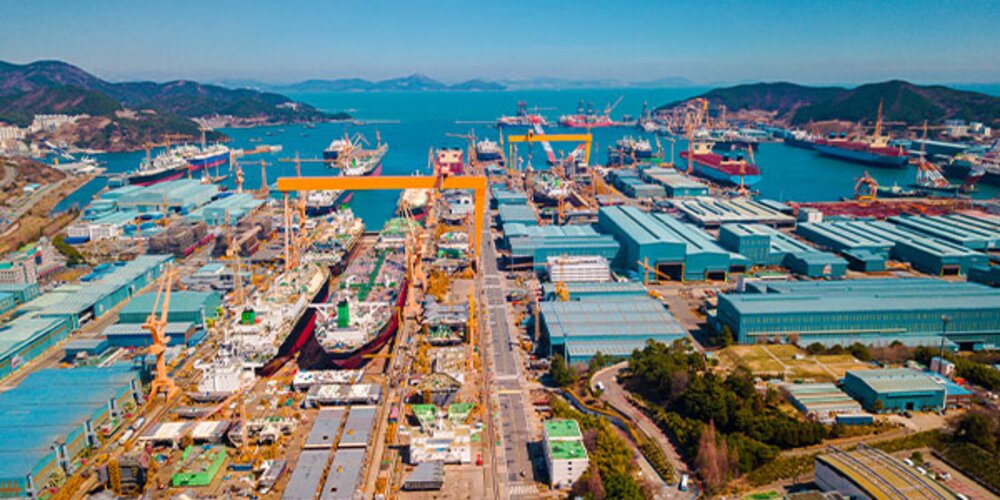Browse our services
Explore how Brookes Bell can help you
Find an expert
Meet our team, find and expert and connect
Contact us
Get in touch, we're here to help

The South Korean shipbuilding industry has been in talks with labour unions for the better part of 2022 and into 2023. But without concrete outcome, it is facing growing challenges with experts predicting a labour shortage of 10,000 by the middle of this year.
Workers are currently demanding an increase of 142,300 won (US $100) per month on their base salary. They’re also demanding a guarantee of 250% of wages in bonuses, in addition to job security as the shipbuilding industry goes through restructuring.
The abolition of the peak wage system - which effectively cuts the wages of older workers - is also another demand of the workers.
The South Korean shipbuilding industry has been in tight competition with Chinese shipbuilders for procuring new orders. Despite maintaining a small advantage for much of 2022, their Chinese counterparts have seen a growth in orders for LNG carriers - pushing the Korean shipbuilding industry into second place.
Monthly data from research organisation Clarksons indicate that South Korea’s shipyards took 42% of orders in October, compared to China’s 53%. However, Clarksons also recorded a decrease of 28% in orders during the first 10 months of 2022.
There are many factors contributing to the current labour shortage, but one of the major causes is the South Korean government’s refusal to provide visas to Vietnamese welders.
Vietnamese welders make up around 40% of the total welders working in South Korea. However, as many as 1,150 Vietnamese welders have been barred from entering the country.
In the meantime, foreign workers from Thailand, Sri Lanka, and Indonesia will substitute these barred welders. The Ministry of Trade, Industry and Energy has confirmed that 3,000 workers are expected to arrive from now until early next year.
The Vietnamese government is facing its own issues, warning migrant workers of a testing scam and fraudulent paperwork.
The South Korean government expects foreign workers to have at least two years of working experience in their trade and obliges them to pass a proficiency test to receive a visa. South Korea’s Ministry of Trade, Industry and Energy announced in early November 2022 that it is in talks with its Vietnamese counterpart to launch a task force to address these issues.
The South Korean Labour Ministry is also concerned about the shipbuilding industry’s ageing workforce. Reports suggest that the percentage of workers in their 20s and 30s has fallen in just over five years from half to a third of the workforce. Over the same period, the percentage of the workforce in their 60s has doubled to more than 6%.
Currently, the South Korean shipbuilding industry has estimated that there is a shortage of around 7,500 workers to meet the current order books. By the second quarter of 2023, this shortage could exceed 10,000 workers.
These factors have spurred the South Korean government to announce a series of new steps to support the shipbuilding industry to keep its competitive position. In the short run, a new programme was announced to encourage and subsidise vocational training to inspire young people to become shipbuilders. Likewise, the government will also increase the number of foreign work visas offered to skilled workers.
The Finance Ministry additionally announced that it will improve unfair agreements between contractors and subcontractors and revamp the existing wage system to take duties and skills into consideration. It wants to reduce the use of subcontractors by the industry by addressing the current labour shortage.
Environmentally-friendly ships are also an urgent matter and another focus for South Korea.
With a goal of attaining 75% market share by 2030, the government will also assist with the labour shortage by transitioning the industry to new ‘smart yard’ technology (also known as unmanned shipbuilding manufacturing systems). Smart yards will ensure the efficiency of the shipbuilding industry.
Notwithstanding these challenges, and an expected slowing of orders through 2023, the industry has a backlog of 36.75 million compensated gross tonnage (CGT), with deliveries scheduled for 2025 and 2026.
For more maritime industry news, insights and developments, read the Brookes Bell News and Knowledge Hub…
Brookes Bell Celebrates a Decade in Asia: Interview | The M.V. Falmouth Bay Incident: What Happened? | Brookes Bell Working on Mitigating Battery Fire Risks at Sea